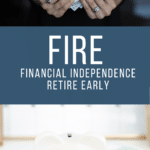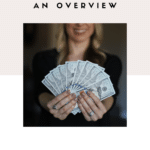Have you heard about the FIRE movement? Here is an overview of financial independence (aka FIRE) and a lot of great concepts to apply to your financial plan for the new year.
My interest in financial independence began with Choose FI
I mentioned in my 2021 word of the year post that I’d gotten interested in the FIRE movement in the second half of 2020. (Chalk that up to wanting to feel grounded and secure amidst a world of chaos.) While I use YNAB for my budgeting, I use Personal Capital to track my savings for the future. I think their retirement calculator is the best out there! I have plugged in 100 different scenarios to see how the numbers shake out. (FYI, both of those are affiliate links.) Having been a listener of the Dave Ramsey podcast for a long time (I finally broke up with him when he got far too conservative for me), I was searching for a new resource for financial information.
Then I stumbled upon the podcast Choose FI (I either heard a cross-over interview on another podcast or found them searching for a specific topic – I forget!) Brad and Jonathan live in Richmond, Virginia, so I immediately felt like we were friends!
Financial Independence is much more about life optimization than it is about money.
Rather than debate theoretical investment strategies or get into the nitty gritty of taxes, I like my financial advice mashed together with real life. AKA I want to know how real people are using it and applying it.
The Choose FI podcast is packed with interviews and stories of how real people are doing life. Some are on the path to FI, some have reached it, and some are simply aiming to be 1% better each day.
The first step to financial independence: FU Money
Brad and Jonathan often say that the ultimate goal is to separate your time from money. If you had enough money to live on forever, work would be optional. You would choose to work because you found fulfillment in your job and not because you had to pay bills.
Those in the community refer to the first step to becoming FIRE as having “FU money.” Which is enough money to be able to walk away from a job you dislike and find a new one without worrying how you’ll pay your bills. It’s the freedom to walk away.
- Article: How Much Is Enough? A Formula For FU Money
- Book: FU Money
But before I lose you at something that seems impossible, know that the podcast is about financial efficiency more than anything else. The more you can optimize your spending and avoid the lifestyle creep that comes with raises, the better chance you have to build wealth and maybe after a while, become financially independent.

You don’t need to be a multimillionaire or have a high paying job to achieve FI
What you do need is a margin between your income and your spending that is proportionally sized to your goals. This is referred to as your savings rate.
What’s a good savings rate?
It depends on who you ask! Generally the financial community encourages people to save 15-20%. Most people don’t hit that.
The FIRE community encourages folks to strike for a high savings rate, especially in your early years. If you can sock away $100k in your twenties you can never save another dime and have a million at retirement. (Check out the site We Want Guac for some Gen Z advice!)
Some in the FI community aim to save 30 percent of their income. Others save up to 70 or 80 percent. As you can imagine the percent varies dramatically based on how much you earn and what you spend.
How to calculate your savings rate
- You can make $60k a year and live on $30k and be at a 50% savings rate.
- Or you can make $200k a year and live on $100k and be there too.
- Or you can make $200k and live on $30k have an 85% rate, but few unicorns do that!
All that to say, it’s a lot easier to make more money than it is to cut your expenses super duper low.
Cool case study by my BFF Jesse Mecham of YNAB: A 50% Savings Rate Is Impossible, Isn’t It?
There are at least Three Types Of FI
Perhaps the most popular name and one of the longest running blogs in the FI community is Mr. Money Mustache. His extremely frugal spending is at one end of the spectrum. Others aim for a FI number higher than a million with larger spending goals.
LeanFIRE
This sub category is for those who have a very frugal spending plan. I would lump them as $40k and below. Check out A Purple Life who spent less than $20k in 2019. She retired on $500k.
FatFIRE
These are people who want to be FI with a generous spending plan (think first class flights and dining out). I’d say $100k and above. Here’s an article about FatFIRE. FatFIRE probably sounds most like what “normal” people are trying to save up by age 65 so they can play golf and travel the world.
CoastFIRE
This sub category is for people who either can’t or don’t stop working but they have saved enough to hit their FI number in a number of years without aggressively saving any more. Maybe you love your job and want to keep working but you want to take your foot off the gas with your savings or work part time hours.
How to calculate your FIRE number
You calculate your FIRE number by multiplying your annual spending (ALL of it – don’t miss annual expenses!) by 25. Why 25? Because it’s the inverse of 4%, which is the amount you can comfortably take out of investment accounts each year and never run out of money, inflation included. While some people think using 3 or 3.5% is even more conservative, 4% is generally the gold standard. Check out Big Ern’s Safe Withdrawal Rate series if you love math!
- If you spend $40k a year, you need $1 million in investments to be FIRE.
- If you spend $100k a year, you need $2.5 million in investments to be FIRE.
- Or if you’re uber frugal like The Purple Life and you spend less than $20k a year, you can retire on $500k.
To those people, not having to work is more important than all the things in the world.
Ways to Comp your lifestyle
If living off of $30k seems impossible (and trust me, it does for me!) some of the ways people do it cancel out the big dollar categories many of us think of as a given.
House Sharing
Make your living expenses go to 0 by having roommates pay the mortgage or finding the perfect house sitting or house sharing opportunity. (I could never do this!)
Travel rewards
Playing the credit card game to earn hundreds of thousands of miles and never pay for a flight or hotel again. (I’m looking into this!) The Choose FI guys are experts on travel rewards and never have to include travel in their spending. Check out their travel 101 course. (Note: you must be extremely responsible and organized to play the credit card game.)
Not owning cars
If you add up a car payment, car taxes, fuel, maintenance, repairs, and saving for a new car, you will realize how expensive cars are. Some FIRE peeps just ride a bike around and save so much money. (It’s also cheap not to have kids LOL!) This falls into the “what is not working worth to you” category. If you didn’t have to work, how often would you drive? It depends on where you live more than anything else, I think.
Rarely dining out
I think we could ALL work on our food budgets – myself included.
Geoarbitrage
A fancy way of saying that you live somewhere with a very low cost of living (especially if you work remotely!) Here’s an article about it: Geoarbitrage.

Start somewhere
Maybe the idea of saving 50% of your income seems impossible. The Choose FI guys often talk about getting “one percent better” all the time. Big goals are achieved with small steps. Calculate your savings rate and aiming to make it better – whether 1 or 30% better – the following year.
You might think at first that there isn’t anything you could cut back on, but you have to think outside of the box. The podcast is packed with tips!
I am fired up about FI!
What fires me up most about the idea of FIRE isn’t not working. It’s the mindset of disconnecting time from money.
I am someone who wants to wake up and feel productive. In the periods of my life when I tell myself I’m going to unplug, I still find ways to check in on my businesses. (Not saying that is a good thing!) But I’d probably be someone who retires from one business just to start another. (Brad and Jonathan are this way too – they say one of the greatest gifts of being FI is the ability to be creative with entrepreneurship.)
I also know that I am a Rebel, and I like to be able to work on what I want to work on in the moment. It is the mindset I’m chasing. To know that if I can’t or don’t work one month that everything will be fine.
We have regular budget meetings to discuss the state of the household spending, and I’m constantly trying to improve that savings margin. But it’s easier to add than subtract, so adding a side hustle or increasing your income in creative ways will get you to FI faster than cutting out a coffee shop run that brings you joy once a month.
Curious about financial independence? Learn more here:
If you have consumer debt, start with Dave Ramsey’s podcast.
Then listen to the Choose FI podcast #100: Welcome to the FI Community
Then watch the Playing with FIRE documentary
If you want to learn more about FIRE, these are some of the best sites out there:
- Choose FI + the Choose FI Book
- Big Ern: Early Retirement Now
- JL Collins: The Simple Path To Wealth + his book
- The Frugalwoods
- Millennial Revolution







Charmaine Ng | Architecture & Lifestyle Blog says
Thanks for the tips, Kath! 🙂
Charmaine Ng | Architecture & Lifestyle Blog
http://charmainenyw.com
Alison says
I’d love to see more personal content about this topic. I’ve been interested in it for around 6 years, when I found MMM. I love seeing content about other people’s spending habits and savings goals. I’d also like to know how the pandemic has changed your goals. Another interesting topic would be how you manage your saving/spending when you are married, but you also have a child from another relationship. Thanks for getting the FIRE word out!
PS- I also used to listen to a lot of DR but he hasn’t just gotten more conservative, he’s gotten so boring with all the new hosts. I can’t stand any of them!
Kath Younger says
I think it’s hard to be super transparent with something as personal as money, but I can see how I can position the topic. I actually am planning to write a post about marriage (per the survey requests) so I’ll figure out how to intertwine those two topics.
Hillary says
Check out the Money Diaries on Refinery29 – they’re interesting to read (and quite personal).
Kate D. says
Such a great post!! Thanks Kath! I cannot wait to dive in and learn more.
Kath Younger says
As they say…the fire spreads quickly! Haha. I love all the puns. There are so many great blogs and podcasts on the topic!
Krystal T says
There’s a wonderful Facebook group called Women’s Personal Finance (Women on FIRE). I’d recommend it for anyone looking to get personal perspective and suggestions after checking out the other resources. It’s a very open, safe-feeling space.
Kath Younger says
Thanks for the recommendation!
Sophie says
Frugalwoods is by far my favorite of those listed, especially because she is a female voice in the FIRE movement. Her posts are way more personal and down to earth, similar to KERF. She also does reader case studies with people figuring out what to do in their financial situation, which I adore. In January and July she does the Frugal Month Challenge (I’m currently doing this as a reset!) and it’s so nice to take a step back and look at everything. Obviously, she didn’t pay me to say this, but I wanted to give her a shoutout because there was only a link at the bottom for her blog! She also has the best breakdowns that I’ve seen for where Dave Ramsey’s practices about debt aren’t good in the long run. (For example, not paying off your house. It is an illiquid asset and if you pour all of your money into paying it off, you would have to sell your house to have cash reserves. With interest rates being so low, investments in low fee index funds will out pace that – 3.25% interest on home, 8-9% return on index funds.)
Kath Younger says
Thanks for sharing! I haven’t spent a lot of time on her site, but definitely know who she is. I want to read more of these case studies!
Sally says
Yes! Admittedly, I’m just not a Dave Ramsey fan, mostly because of his politics but also because there’s a lot of “poor shaming” with him. But also, a lot of his advice just doesn’t make financial sense! I understand saving to buy what you can in cash, but some debt (i.e., a mortgage) IS good debt, and your point about not paying off your mortgage while rates are so low is a good one. Will look into Frugalwoods, as that’s new to me!
Amanda Filler says
Great post!
As a christian, I am familiar with Dave Ramsey’s approach.
I’m also lucky that my husband is in the design and finance field. How people spend money is very interesting, including how they interact with their credit cards and bank accounts. I have learned so much from my husband about people’s spending habits and proportions of savings. And I am def. interested in the podcasts you mentioned and linked to!
Caitlin says
Love this post, Kath!. I started reading some of MMM’s posts a few years ago. I’m not quite as hardcore as him, but I love the concept and am striving for financial independence. This was a nice recap of other resources for me to check out! Thank you.
Bonnie says
I’ve been into the FIRE movement for about seven years or so, after reading MMM and the comments on his blog (and another BIG favorite was MontanaMoneyAdventures.com, written by Jillian Johnsrud – her posts are very relatable and inspire you to think about WHAT you want … also ThePrudentHomemaker.com – I’m not LDS but enjoy the frugal ideas from her and those who comment). The FIRE lifestyle and goals mesh with our beliefs and that, I think, is one of the most important facets. If you don’t WANT to curtail spending on non-“essentials” (your decision as to what essential means) and get to the core of what spending (amount and on what) is important for you/your family, it’s just another passing fad.
My husband and I are not engineers, software designers, IT specialists, or in careers bringing in high salaries, yet we’ve saved a majority of our income since we began this route, investing for retirement while not missing out on enjoying life now. We still live in our “small” home of 1400 sq ft, which is still close to twice the size of a home in much of Europe. We don’t buy things just because it’s a holiday or Valentine’s Day or our anniversary or because we’re on vacation, or someone else has something we like, or we’re in Target or TJ Maxx and these candles or linens look nice. We don’t just sit and read to save money, though … we travel, camp, enjoy our pets and toddler grandkids, try to visit Europe every few years, enjoy the theatre and performances when we could attend live events, and have fun with our hobbies as well. Aligning our spending with our goals has brought such peace of mind.
The best advice I received from friends who retired early was to know where your spending goes… what are you spending your money on? How much? Why? Is it worth it to you? … is the “more” just “more” or is it “better”?
Robin says
You’re correct about rewards credit cards. If you are someone who is very disciplined about only charging what you can pay in full each month, it definitely pays off. When my husband and I started dating over 20 years ago, we both happened to have travel rewards credit cards with the same airline. We were dating long-distance at the time, so we used the miles to visit each other. Once we were married, we made a point to take a vacation requiring air travel only if we had the miles saved for a free flight.
When we were first married, we had to live very frugally. Our family and friends made a point to give us restaurant gift cards for our birthdays or holidays, as they knew we only ate out if we had coupons or gift cards. To this day, we still have an envelope labeled “restaurant gift cards” and we look in there before we ever decide to eat out at a restaurant. It’s funny how habits become “engrained” once you’ve lived a certain way for years!
Kath Younger says
You guys have been smart from the start!
Maria says
I think I commented on this topic on your Word of the Year post, but we “Fat Fired” this time last year and moved to the Charlottesville area from California (we are from VA, so it was an easy decision). My husband and I were lucky enough to discover this movement right out of college in 2006 and immediately started working on the plan. Because we were super poor out of college (car payments, student loans, living in a high cost area in CA), we never really had a chance to live a fancy lifestyle and for the most part, kept our frugal ways while we continued to move up in our careers. It was all we knew, so it didn’t feel like we were making sacrifices. We splurged on travel and sometimes food, but otherwise kept our lifestyle simple and quickly gave up on the idea of “Keeping up with the Jones'”. It was definitely a mental shift. If I got a bonus at work, I decided that money was not mine. It was “future Maria’s” and away it went to our Vanguard account. My paycheck amount was not my salary, it was my salary MINUS the amount of money it took to max out my 401k. Anyway, we happily FIRED (and retired) before the pandemic and that has allowed us to safely stay at home with our toddler during these times and obviously it has been 100% worth it. We are now excited to start turning hobbies into sources of income and the freedom of that is incredible. Best of luck on your journey!
Kath Younger says
I didn’t realize from your first comment you are in Cville! I’d love to have coffee (after pandemic?) or toddler play time (outdoors, park?) sometime so we can chat it up!!
Christine says
Love this post! My husband and I are big in the FIRE movement and it’s something we talk about all the time. It’s exciting to see others talking about it so I don’t feel like such an oddball (LOL).
Right now we save over 60% of our income and have a goal of achieving financial freedom in ~5 years. For us the appeal is definitely about having “FU” money and the freedom to choose how we spend our time. We both envision ourselves having side gigs of some kind to keep ourselves engaged with the world (and bring in some more “fun money”) but mostly I love the idea of having more time with my children (we just had our first in 2020).
Our biggest unanswered question with FIRE is where to live once we “pull the plug” since we know we want a lower cost of living area to maximize our nest egg (we currently live and work in the NYC metro area). One of the reasons I love your blog is because Charlottesville is actually on our list o places to move to and I enjoy seeing what your life is like and activities for families in the area 🙂
Kath Younger says
I love reading about so many of you into this! 60% savings rate is awesome. And you should totally move to CVille!
Christie says
I learned so much! Been reading about this now for the last couple of hours. Thank you for sharing.
Kath Younger says
So glad it was helpful!
Sam says
Hi Kath – not sure if anyone has told you this but the ads on your page cause the page sections to jump around on the mobile version. It was impossible for me to read this because the page kept jumping from section to section 🙁
Kath Younger says
Yikes. I’d submit a ticket with my team.
Steph says
Great post! I have also done Dave Ramsey in the past and had a lot of success with it while paying off debt. I’m ready for something else now. I will checkout the Playing with Fire documentary and the podcast. Thanks for the info!
Meghan says
Kath,
I loved reading this post! Truthfully, my husband is the one in our marriage who is the total money nerd. I whole heartedly support our financial goals, and we are on same page with our money, but he’s the one who loves to pour over retirement calculators and spreadsheets. It was great getting a woman’s perspective on FIRE. I think my husband are about there. Like was mentioned above, the key is living well below our means and being content. We live in the same house we built 11 years ago, when we barely had a positive net worth. Today we have a net worth of 1.4 million. (We are 42 and 40.) I don’t think anyone would guess we are millionaires because we live pretty frugally.
I disagree with the readers who commented about not paying off the house. Paying off the house is not about the investment or return. It’s about the complete freedom. We paid the last of our mortgage with a $147,000 bank check. It was hard to let go of that, and easy to do the math on an investment of $147,000. But we’ve never looked back. My husband had originally planned to retire at 45 to do something else for probably a lot less money. However, now that we have zero debt and we are on track to retire wealthy, he has really grown to love his work. He works in a very demanding field, but now that we are free, he enjoys the challenge. The fact that he could walk way from his job tomorrow, and we can live on my very small salary (I love what I do), has made him a better leader and team member.
Kath Younger says
What an awesome story – thank you for sharing!
Robin says
Meghan,
I completely agree. There are a lot of people who are secretly very wealthy, but you would never have any idea because of the lifestyle they live.
In terms of paying off a mortgage, it is all about what would help you live most freely. For some people, it is knowing it is paid off in full and there is one less thing “to worry about.” For other people, the opportunity to build their wealth through investments while paying minimal interest on a mortgage may help them live more comfortably.
I find the psychology behind the financial choices people make very fascinating. There are many ways to reach your personal goals. It is all about finding what works best for you!
Meghan says
Right! Some people may want to enjoy life more right now and not later. Money tied up in retirement accounts may not be appealing to everyone. I totally get that. We don’t have fancy things lol. I think this covid year has really shown us that we haven’t traveled enough, and we want to make that a priority and back off of the saving.
Alexandra Caspero says
Love this! We got into this mindset a few years ago and it’s really paid off. 😉 We decided to “live” on my income and then we save and invest my husbands paycheck. It’s been really easy to divide income/savings this way and honestly haven’t felt that big of a difference once we got serious on our budget for various items. We are big into the credit card/travel rewards game, but my husband is very disciplined in it to ensure that we are meeting the criteria for each one and paying each one off/closing before the annual fee hits. Honestly, I’m too disorganized and could never do it, but glad that his brain likes it! 🙂 We’ve taken some incredible trips this way!
Kath Younger says
That is totally awesome!
Elizabeth says
I didn’t know about FIRE but think I live its values. I made the decision a few years ago when I got divorced that I had to take control of my finances. I had almost no savings after my divorce because I bought my husband out of the house so was starting from scratch. I made the hard decision to move me and the kids and rent out my “big” house and buy a much smaller house to live in. We’ve been in the small house for 2.5 years. Rent I collect on the big house pays both mortgages and then nets a bit more each year. It was the best financial decision I have ever made but at the time all my friends thought I was nuts, so I definitely had doubts. Downsizing and eliminating housing costs let me save almost 50% of my income last year and my goal is to save that much this year.
The drastic action I took last year was to fire my investment broker of 20 years and move all my retirement accounts to Vanguard. The fees at the traditional brokerage were eating way too much into my returns. Highly recommend scrutinizing your investments and make sure they are working FOR you.
Thanks for posting the FIRE info. Can’t wait to start reading about it.
Ann says
This is a fun topic! Also a big fan of personal finance and FIRE!
Would only push back on the comment that kids are not cheap… that’s not been my experience and would encourage parents to consider all the options when raising financially savvy kiddos 🙂 Lots of examples from MMM himself https://www.mrmoneymustache.com/2011/10/12/avoiding-ivy-league-preschool-syndrome/
Kath Younger says
Ha! I’m sure I fall into Ivy League preschool cost but #worthit 🙂
Alana says
A lot of this post resonates with me! My husband and I used Dave Ramsey’s method to pay off student loan and car debt before 30. Then we saved up, sold our house and most of our “things” and quit our jobs at 31. We spent two amazing years traveling around the world together while we were still young and healthy. Now we geoarbitraged and are 5-7 years from FI. We’ll be able to retire by 45. We are also huge travel credit card rewards fans (my husband travels for work) and enjoy 2-3 vacations a year. That’s where we choose to spend our money. On the flip side, you’ll never hear me joke about walking into Target and accidentally spending $100. Everyone has their thing and you can still have it and save responsibly too! 🙂
Kath Younger says
This is all awesome!
Jenni says
I am mother of two from upstate New York and trying to achieve FI, before mid thirties. I had this sudden realization during pandemic and set myself to spend less and sane more. But, I often find myself lost contemplating whether I am following the right approach or not. I am glad that you cut down the FI in there different types along with little tips to cut down my daily expenses. Again, thanks for sharing.